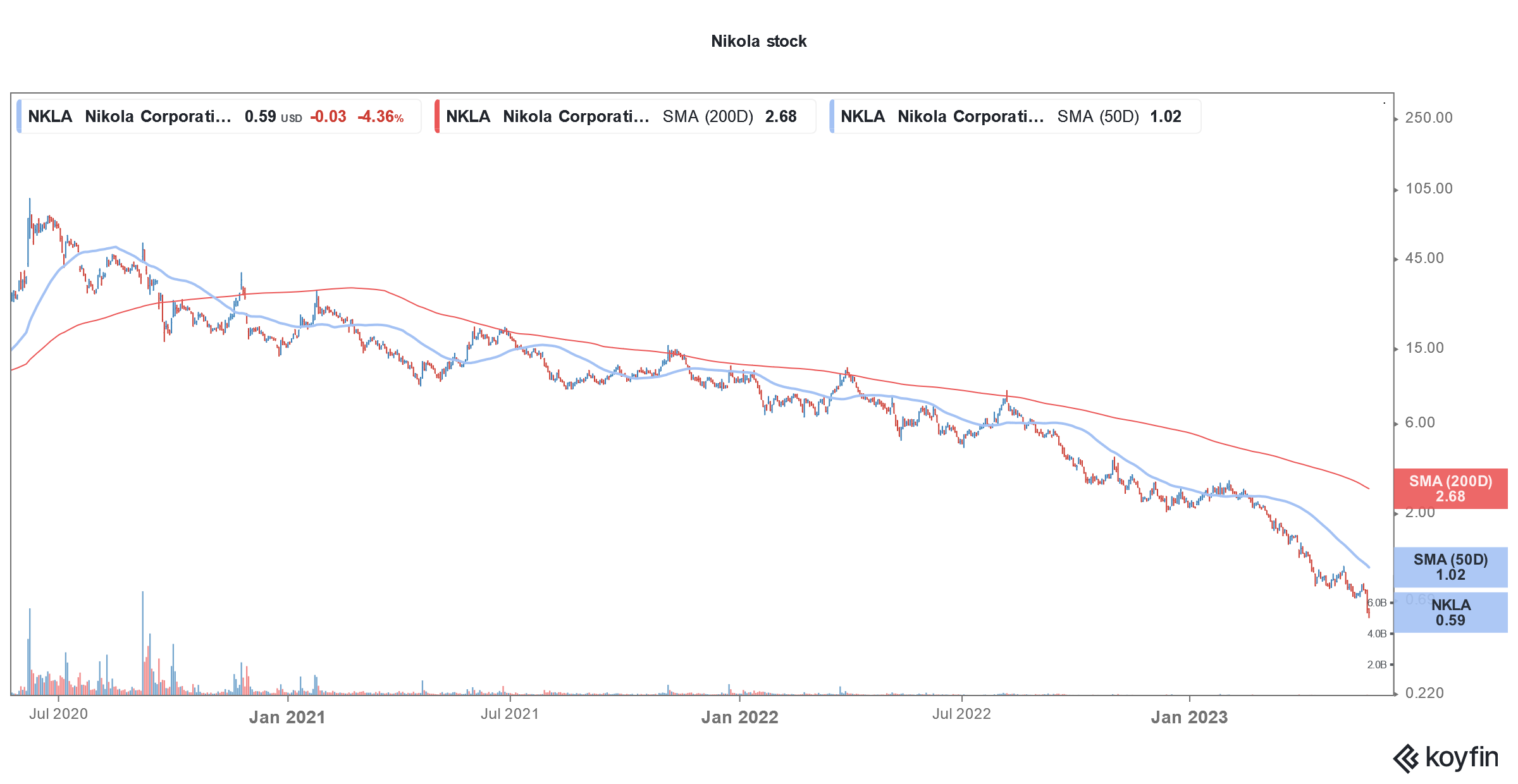Nikola Stock Crashes to Record Lows after Exchange Delisting Warning
Please note that we are not authorised to provide any investment advice. The content on this page is for information purposes only.
While the wider US stock markets rallied yesterday, Nikola (NYSE: NKLA) stock slumped to a record low amid fears of a possible delisting from the US markets.
The Nasdaq listing rules mandate that stocks should have a closing price in excess of $1 for 30 consecutive business days – a level that Nikola stock hasn’t crossed since April 11.
If a stock is not in compliance with the listing rules it gets a delisting warning from the exchange. To be sure, Nikola is not the only company that has got the warning. In the EV (electric vehicle) space only, Arrival, Canoo, and Lordstown Motors have received delisting warnings from the exchange for not satisfying the minimum listing conditions.
Nikola stock crashes after exchange delisting warning
Nikola still has time until November 20 to meet the listing requirements and its stock should close above $1 for 10 consecutive trading days to maintain the listing. Meanwhile, companies typically opt for a reverse stock split to lift their stock price and meet the listing requirements.
A reverse stock split is the reverse of a stock split. While companies announce stock splits when the stock rises too high – as was the case with Tesla – reverse stock splits are mostly done to meet the exchange listing requirements.
The market’s reaction to both is also diametrically opposite. While stocks typically rise on stock split announcements, they tend to fall on a reverse stock split. However, fundamentally both stock split and reverse stock splits don’t make any difference.
The EV sector’s troubles are rising
The slump in stock prices of startup EV companies like Canoo, Arrival, Lordstown Motors, and Nikola tells a sad story of how the euphoria of 2020-2021 has now busted. All these companies went public through SPAC reverse mergers which helped them list much more quicker than traditional IPOs.
Also, given the massive investor appetite for EV names, these companies managed to attract rich valuations.
Nikola went public in 2020
When Nikola went public in 2020, it was among the first EV SPACs (special purpose acquisition companies). At its peak in 2020, the company’s market cap was in excess of $30 billion and it surpassed Ford’s then valuation.
It was among the early signs of an impending bubble in EV stocks. However, thanks to the Fed’s accommodative monetary policies and scores of SPACs hunting for EV targets, the bubble continued to build and only got bigger by the end of 2021.
When Rivian listed in 2021, it became the biggest listing since Facebook’s 2012 listing. Rivian’s IPO sailed through easily and the company priced the shares at $78 each, which was above the already increased price range. The stock had a good listing and went on to hit an all-time high of $179.47, which was over twice the IPO price.
At its peak, Rivian commanded a market cap of over $150 billion which was even higher than General Motors, America’s biggest automaker.
Fast forward to 2023 and valuations of EV stocks have slumped. While Nikola’s market cap is just above $422 million, Rivian is at $14.2 billion.
EV companies are struggling with execution
Almost all the startup EV companies are struggling with execution and perennial losses and cash burn.
Nikola for instance expects to build only between 250-350 battery semi-trucks in 2023 and between 125-150 trucks powered by hydrogen fuel cells.
The company’s production targets are quite modest considering what it was originally targeting. But then, we cannot single out Nikola alone as the same story is playing around in almost all other startup EV companies.
Lucid Motors for instance expects to produce above 10,000 cars this year – which is a fifth of what it guided for during the SPAC merger in 2021.
Lordstown Motors is also producing only a handful of cars and the production is running way behind the original schedule.
Nikola is restructuring the business
Nikola is restructuring its business to conserve cash and focus on key priorities. During the Q1 2023 earnings earlier this month, it said, “We have reprioritized the business, focusing on the North American market, hydrogen fuel cell trucks, HYLA hydrogen ecosystem, and autonomous technologies, vehicle controls, and software.”
It also said that it is selling the stake in the European manufacturing joint venture to Iveco Group for a cash consideration of $35 million.
The company ended March with cash of $206.3 million and raised another $100 million in April.
It is lowering its cash burn and targeting gross margin breakeven by the end of this year and positive EBITDA by 2025.
Nikola slumps toward all-time lows
Nikola stock fell to its all-time lows yesterday. The fate of many de-SPACs, or the companies that went public through SPAC reverse mergers, is no different. Lordstown Motors has warned of bankruptcy if its production partner Foxconn opts out of the funding deal.
Between 2020 and 2021, loss-making companies were able to raise capital quite easily due to the availability of easy money.
Now, as Fed has raised rates to multi-year highs, startups face a funding winter. Even some of the listed names are facing trouble raising funds as not many investors are willing to back perennially loss-making companies with unproven business models.
As for Nikola, like other startup EV companies, the road ahead looks quite bumpy amid a deteriorating economy and rising competition in the EV industry.






